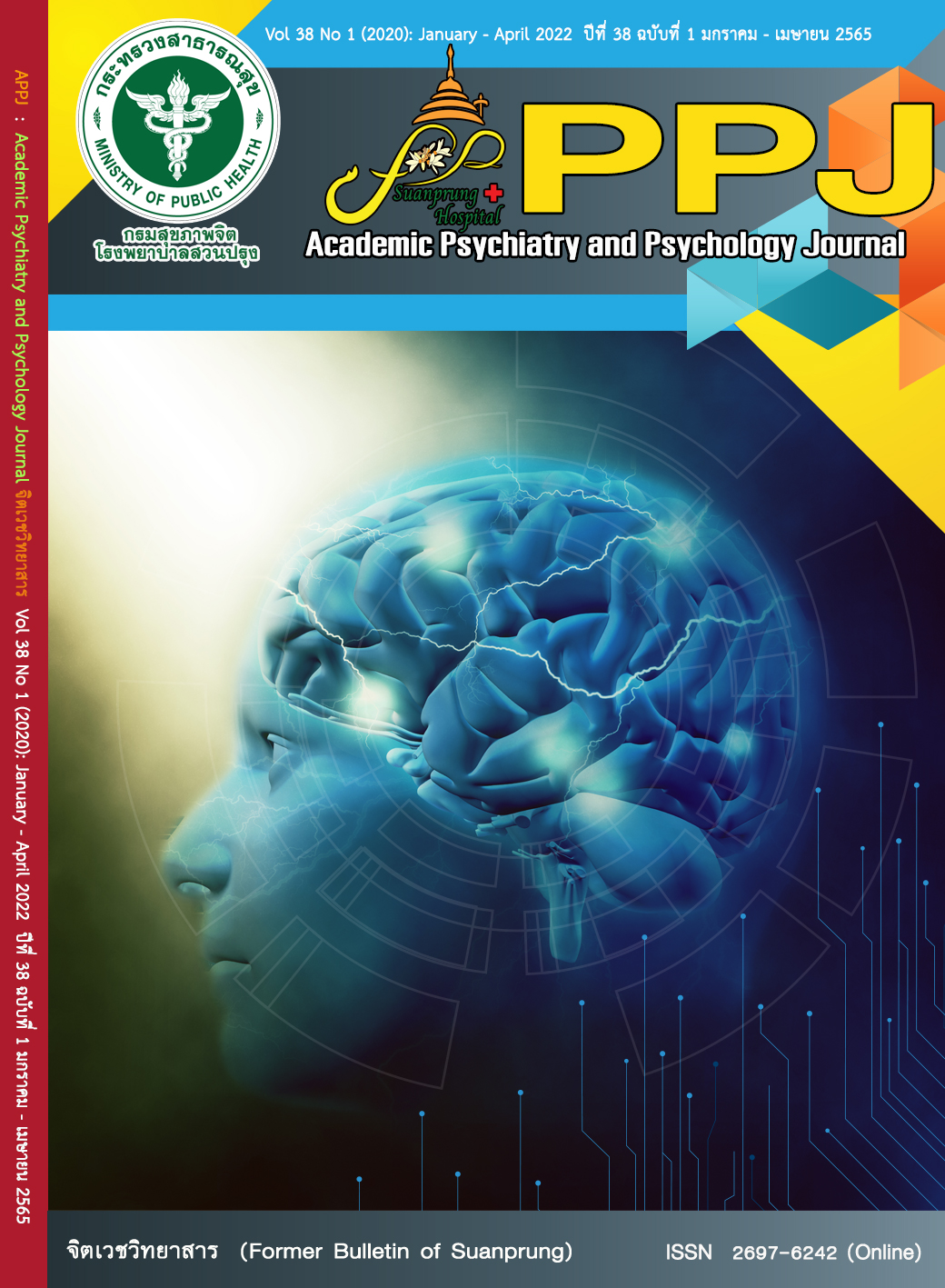The Development and Instrument Validation of The Thai Version of The Relationship Structures Questionnaire : A Pilot Study.
Main Article Content
Abstract
Objective This study aimed to develop and validate psychometric properties of the Thai Version of the Relationship Structures Questionnaire (ECR-RS).
Materials and Methods Data were collected between February – March 2019 from 154 Thai university students by the developed Thai version of the ECR-RS. The questionnaire was then analyzed for internal consistency reliability and construct validity.
Results The Thai version of the ECR-RS had an overall alpha coefficient of .76. Alphas for avoidance and anxiety subscales were .78 and .88, respectively. Construct validity was reflected by a model that fitted well with data (χ2 = 29.27, df = 19, p > .05; GFI = .96, CFI = .98, RMSEA = .06).
Conclusion The developed Thai ECR-RS was well established in its psychometric properties. Its reliability and validity were consistent with the original instrument.
Article Details

This work is licensed under a Creative Commons Attribution-NonCommercial-NoDerivatives 4.0 International License.
บทความหลังผ่านการปรับแก้จากกองบรรณาธิการแล้ว เป็นลิขสิทธ์ของวารสารจิตเวชวิทยาสาร โรงพยาบาลสวนปรุง กรมสุขภาพจิต กระทรวงสาธารณสุข ห้ามเผยแพร่เพื่อประโยชน์ทางการค้าโดยไม่ได้รับอนุญาต แต่อนุญาตให้เผยแพร่บทความดังกล่าวเพื่อประโยชน์ทางการศึกษาแก่ประชาชนทั่วไป ทั้งนี้กองบรรณาธิการไม่จำเป็นต้องเห็นด้วยกับบทความหรือข้อคิดเห็นใดๆ ที่ปรากฏในวารสารสวนปรุง
References
Bowlby J. A secure base: parent-child attachment and healthy human development. New York: Basic Books; 1988.
Bartholomew K. Avoidance of Intimacy: An Attachment Perspective. J Soc Pers Relat. 1990;7(2):147-78. doi:10.1177/0265407590072001.
Bartholomew K, Horowitz LM. Attachment styles among young adults: a test of a four-category model. J Pers Soc Psychol. 1991 Aug;61(2):226-44. PMID: 1920064.
Brennan KA, Clark CL, Shaver PR. Self-report measurement of adult attachment: an integrative overview. In: Simpson JA, Rholes WS, editors. Attachment theory and close relationships. New York, NY: Guilford Press; 1998. p.46-7.
Fraley RC, Hudson NW, Heffernan ME, Segal N. Are adult attachment styles categorical or dimensional? A taxometric analysis of general and relationship-specific attachment orientations. J Pers Soc Psychol. 2015 Aug;109(2):354-68. PMID: 25559192.
Ravitz P, Maunder R, Hunter J, Sthankiya B, Lancee W. Adult attachment measures: a 25-year review. J Psychosom Res. 2010 Oct;69(4):419-32. PMID: 20846544.
Main M, Goldwyn R. Predicting rejection of her infant from mother's representation of her own experience: implications for the abused-abusing intergenerational cycle. Child Abuse Negl. 1984;8(2):203-17. PMID: 6539642.
Sibley CG, Fischer R, Liu JH. Reliability and validity of the revised experiences in close relationships (ECR-R) self-report measure of adult romantic attachment. Pers Soc Psychol Bull. 2005 Nov;31(11):1524-36. PMID: 16207771.
Bäckström M, Holmes BM. Measuring adult attachment: a construct validation of two self-report instruments. Scand J Psychol. 2001 Feb;42(1):79-86. PMID: 11273581.
Fraley RC, Waller NG, Brennan KA. An item response theory analysis of self-report measures of adult attachment. J Pers Soc Psychol. 2000 Feb;78(2):350-65. PMID: 10707340.
Wongpakaran T, Wongpakaran N, Wannarit K. Validity and reliability of the Thai version of the Experiences of Close Relationships-Revised questionnaire. Singapore Med J. 2011 Feb;52(2):100-6. PMID: 21373736.
Chris Fraley R, Niedenthal PM, Marks M, Brumbaugh C, Vicary A. Adult attachment and the perception of emotional expressions: probing the hyperactivating strategies underlying anxious attachment. J Pers. 2006 Aug;74(4):1163-90. PMID: 16787432.
Fraley RC, Heffernan ME, Vicary AM, Brumbaugh CC. The experiences in close relationships-relationship structures questionnaire: a method for assessing attachment orientations across relationships. Psychol Assess. 2011 Sep;23(3):615-25. PMID: 21443364.
Moreira H, Martins T, Gouveia MJ, Canavarro MC. Assessing adult attachment across different contexts: validation of the Portuguese version of the experiences in close relationships-relationship structures questionnaire. J Pers Assess. 2015;97(1):22-30. PMID: 25175516.
Budsayaprateep P, Burapavong J. The roles of attachment styles and attribution styles towards relationship satisfaction. Kasetsart J. Soc. Sci. 2012;33:356-69. (in Thai)
Wongpakaran T, Wongpakaran N. A short version of the revised 'experience of close relationships questionnaire': investigating non-clinical and clinical samples. Clin Pract Epidemiol Ment Health. 2012;8:36-42. PMID: 22675397.
Muthén LK, Muthén BO. How to Use a Monte Carlo Study to Decide on Sample Size and Determine Power. Struct Equ Modeling. 2002;9:4:599-620. doi: 10.1207/S15328007SEM0904_8.
Sibley CG, Liu JH. Short-term temporal stability and factor structure of the revised experiences in close relationships (ECR-R) measure of adult attachment. Pers Individ Dif. 2004;36(4):969-75.
Nunnally JC, Bernstein IH. Psychometric theory. 3rd ed. New York: McGraw-Hill; 1994.
Siroňová A, Cígler H, Ježek S, Lacinová L. Psychometric characteristics of the ECR-RS, structure of the relationship between global and specific attachment - cross-validation of the results using the czech and original versions of the ECR-RS. Stud Psychol (Bratisl). 2020;62(4):291-313. doi:10.31577/sp.2020.04.806.
Sarling A, Jansson B, Englén M, Bjärtå A, Rondung E, Sundin O, et al. Psychometric properties of the Swedish version of the experiences in close relationships- relationship structures questionnaire (ECR-RS global nine-item version). Cogent Psychol. 2021;8(1). doi: 10.1080/23311908.2021.1926080.

